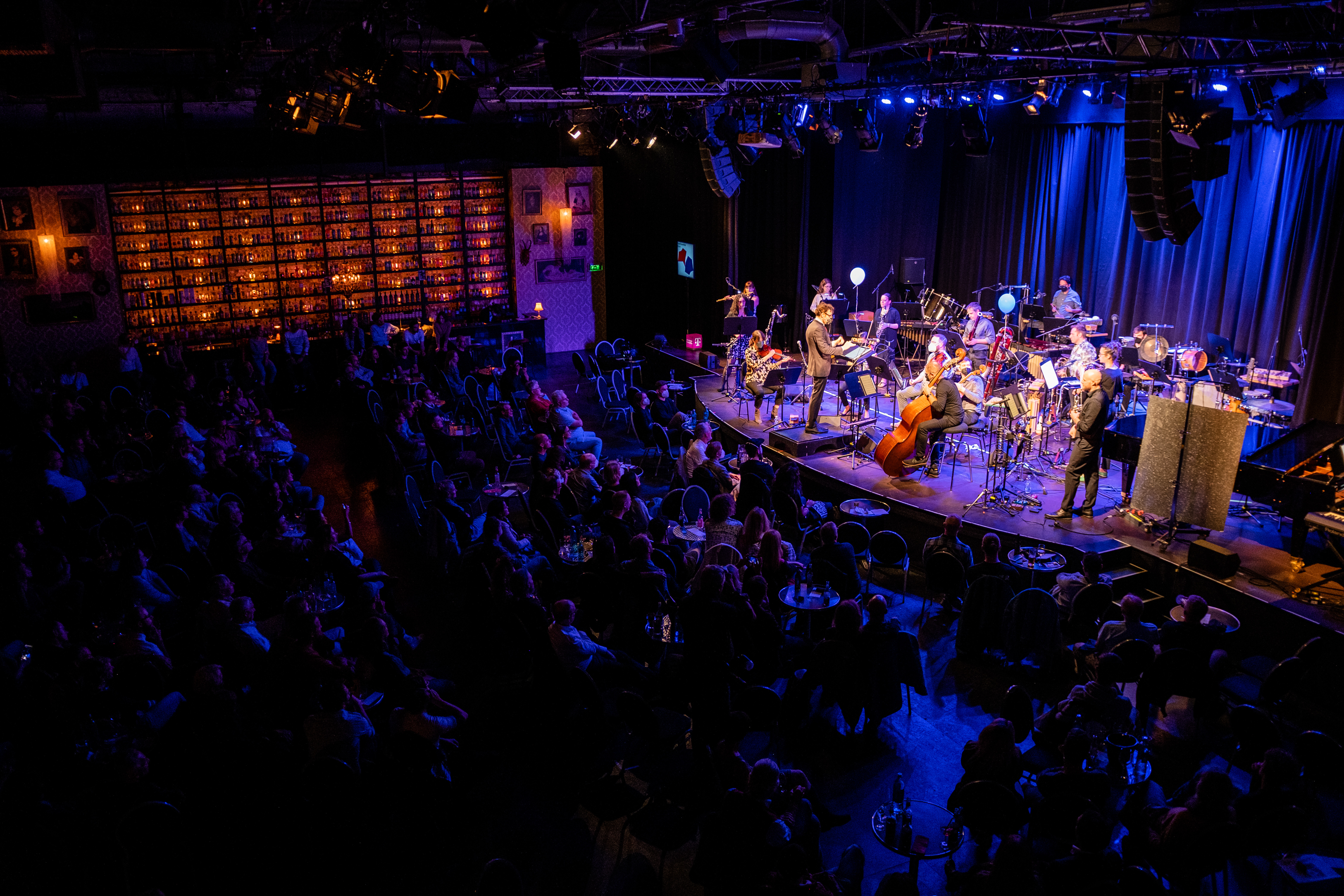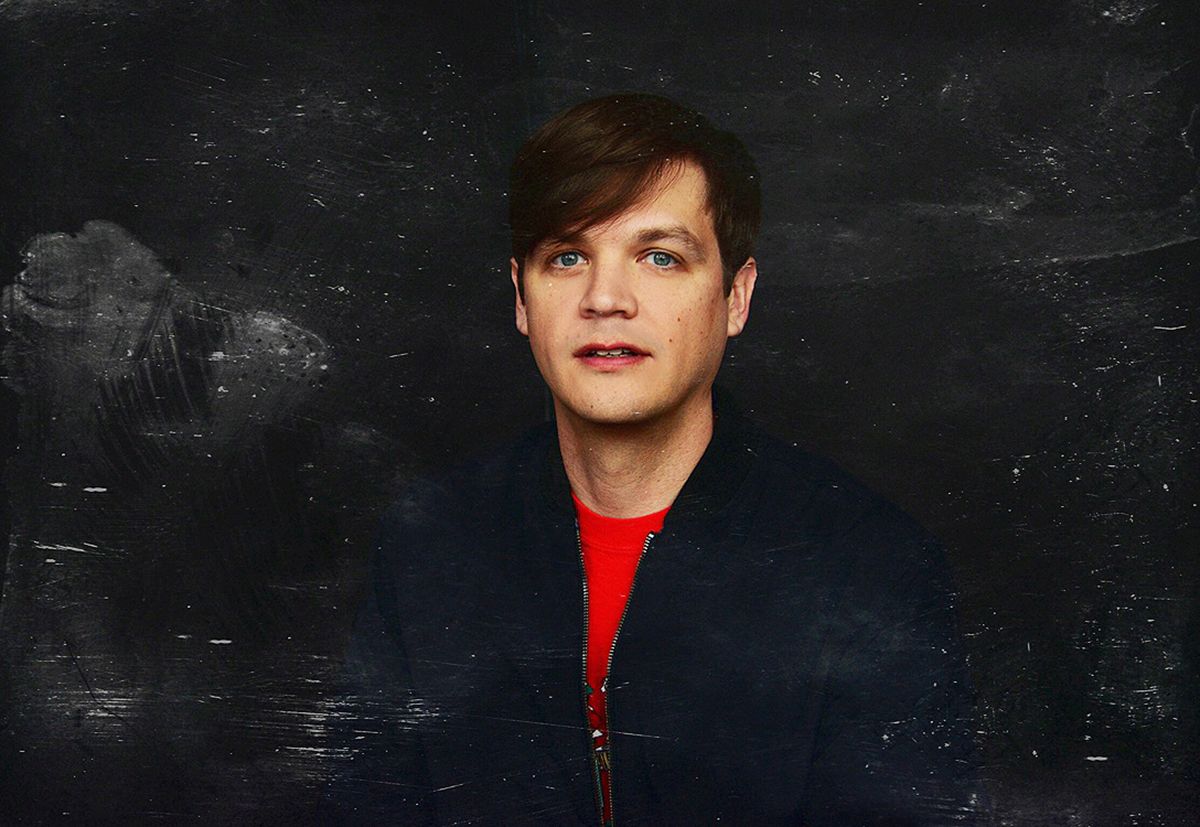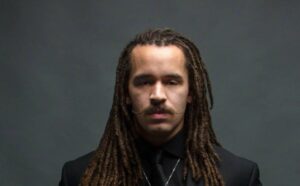
Keep in touch with AWS
Friday, March 22nd, 7:30 pm
Kirkwood Performing Arts Center
Kirkwood, MO
PROGRAM
TANIA LEÓN Toque
CHRIS P. THOMPSON Hanabi (in-ear extended mix) (arr. Miles Brown and Chris. P. Thompson)
CHRISTIAN QUIÑONES Hasta que no pueda
DAMON DAVIS Ligeia Mare: The Radio Opera, Episode 4 (arr. Ted Hearne and Dave Ragland Jr.)
ELIJAH DANIEL SMITH Vermilion Glare
TEXU KIM Līlā
BORA YOON Casual Miracles
TANIA LEÓN Gran Toque (arr. John Orfe)
*written for Alarm Will Sound
†arranged for Alarm Will Sound
NOTES

Tania León, Toque/Gran Toque
About the Composer
Tania León is highly regarded as a composer and conductor, and for her accomplishments as an educator and advisor to arts organizations. Her orchestral work Stride, commissioned by the New York Philharmonic, was awarded the 2021 Pulitzer Prize for Music. In 2022, León was named a recipient of the 45th Annual Kennedy Center Honors. The following year, she was awarded the Michael Ludwig Nemmers Prize in Music Composition from Northwestern University. Most recently, León became the London Philharmonic Orchestra’s composer-in-residence—a two-year post that began last September. She also holds Carnegie Hall’s Richard and Barbara Debs Composer’s Chair for the 2023–2024 season. She has been awarded the XIX Premio SGAE de la Música Iberoamericana Tomás Luis de Victoria 2023, becoming the first woman to be honored with Spain’s highest composition prize. In 2024, she earned the Distinguished Artist Award from the International Society for the Performing Arts.
In addition to composing, León’s activities include being a founding member and first music director of Dance Theatre of Harlem, founding the Brooklyn Philharmonic’s Community Concert Series, co-founding the American Composers Orchestra’s Sonidos de las Américas festivals, serving as new music advisor to the New York Philharmonic, and founding and serving as artistic director of Composers Now. In 2023, Columbia University’s Rare Book & Manuscript Library acquired León’s archive.
In the Composer’s Own Words
The word toque in Spanish means “touch” and is used not just for physical touch, but also to signify playing an instrument, playing a game, sounding an alarm, or giving something a finishing touch. This composition is inspired by a famous Cuban dance tune (or danzón) called “Almendra,” which means “almond” in English. “Almendra” was composed in 1938 by the Cuban bandleader Abelardito Valdés. This tune is so well-known that a Cuban needs to hear only two notes of it to recognize the piece. Danzón is the official dance music of Cuba and is based on European ballroom dancing. It is elegant and virtuosic, and generally has a light and sprightly feel.

Chris P Thompson, Hanabi (in-ear extended mix)
About the Composer
Chris P. Thompson is a percussionist and composer. Having grown up among the high-energy sound world of modern marching percussion and various genres of electronic music, he creates work that glows with mathematical precision and illustrates vivid scenes of potent emotional states. His fifth album of original compositions, Stay the Same, will be released April 4, 2024. In October 2020, he released True Stories & Rational Numbers. A nine-movement work sequenced as electronic music but also fully scored for four pianists, it represents his investigation of just intonation and the natural mathematics of rhythm and harmony. Described as “like a futuristic blend of Aphex Twin, Roger Eno, and Erik Satie” (anEarful), True Stories received its world premiere live performance at London’s Barbican Centre in 2021. That same year he collaborated with playwright Rajiv Joseph and Chicago’s Steppenwolf Theatre Company to create Red Folder, an illustrated play for the Steppenwolf NOW series. Red Folder was also adapted as an educational program that reached more than 5,000 young people in 70 schools.
In the Composer’s Own Words
The original Hanabi was a short track on my EP Lot Hero from 2017, wherein I played with the similarities between quick, articulated samples of marching percussion instruments and the pops and sizzles of a fireworks show I had sampled. (Hanabi means “fireworks” in Japanese). This track was also the first time I ever incorporated the sound of a metronome into my music (a creative delight that has proven endlessly fruitful in my work to this day). I wanted to create a subtle transition: from
the rigid structure of metronomic time to the chaotic entropy of fireworks.
After the record was out, I started working on a way to perform it live, which would involve me performing on a setup that included marching tenors. To open the show, I would play an extended version of Hanabi, where the backing tracks spun out the metronome sounds into different grooves, complemented by live drum kit and electric bass.
The live show I was developing never came to fruition, which is sad because I was excited by the idea of playing my music live with drummer and bassist friends. However, the extended, click-heavy version of Hanabi was interestingly different enough that I actually included it on my next album as Hanabi (in-ear extended mix). If Aphex Twin could remix himself I figured I could too.
Eventually, Hanabi (in-ear extended mix) entered the ears of one Miles Brown, and next thing I knew … here is a full arrangement for Alarm Will Sound, and I get to play my terrifying marching tenor parts live with my friends after all.
Christian Quiñones, Hasta que no pueda
About the Composer
Christian Quiñones is a Puerto Rican composer who explores personal stories through the lens of cultural identity. From sampling and auto-tune to interactive multimedia, he actively interacts with existing music to create intertextual narratives. His music has been performed by Alarm Will Sound, St. Louis Symphony Orchestra, Dogs of Desire, JACK Quartet, New York Youth Symphony, American Composers Orchestra, ~Nois, Yarn/Wire, TAK Ensemble, icarus Quartet, Bergamot Quartet, Hub New Music, and Ensemble Dal Niente. He was recently selected as a composer-in-residence at the Copland House. Other fellowships include the Cabrillo Festival of Contemporary Music, Bang on a Can Summer Music Festival, and Eighth Blackbird Creative Lab.
In the Composer’s Own Words
One of my most constant fears in life is reaching the day when my mother can’t hear me or listen to music. She has congenital hearing loss and I still clearly remember the day when as a kid I understood what that meant. The terrifying thought of her one day not being able to understand me or being able to enjoy music has always been a persistent but seemingly distant dread, but a lot of that has become more imminent recently. The past year we received the news that her hearing loss reached fifty percent in one ear. After that moment, even in the most mundane situations in life, I often think about “how would my mom listen to this?” with the help of a website that simulates the effect of different types of hearing loss, this piece strives to answer that question. The piece takes short samples of many songs that I didn’t necessarily like, but that my mom used to listen to a lot when we were growing up, and reimagines them through a filtered and maximalist lens. Sonically, the piece slowly morphs from a muted and dark soundscape into a brightly colored and vibrant texture that mirrors my mother’s congenital chronic condition.

Damon Davis, Ligeia Mare, The radio opera: episode 4
About the Composer
Damon Davis is an award-winning, post- disciplinary artist based in St. Louis. His work spans a spectrum of creative mediums to tell stories that explore how identity is informed by power and mythology. Davis is co-director of the
critically acclaimed documentary Whose Streets? that chronicled the 2014 Ferguson uprisings. In 2020, critic Ben Davis cited his project All Hands On Deck, which captured the hands of people who shaped and upheld the Ferguson movement, as one of the “100 Works of Art That Defined the Decade.” His work has been nominated for a Peabody Award and is featured in the permanent collection of the Smithsonian’s National Museum of African American History and Culture. Davis is a Firelight Media, Sundance Labs, TED, and Kennedy Center Citizen Artist fellow.
In the Composer’s Own Words
Ligeia Mare is a sci-fi electronic fantasy opera written and composed by myself. Inspired by the life and philosophy of jazz legend Sun Ra, the story follows Cosmo, an awkward adolescent with the gift of astral projection while dreaming. When Cosmo’s jazz pianist father, Cassius, falls ill with brain cancer, Cassius begins to believe he is actually from Saturn and had forgotten years before during his crash landing. Cosmo knows the key to saving his father lies somewhere in the stars, exploring the solar system every night on his quest. As the real world and the dream world begin to blur together, Cosmo discovers his true identity in his dreamland by building his own myths that turn out to be true, demonstrating the power of myth in our own self-discovery.
Elijah Daniel Smith, Vermilion Glare
About the Composer
Elijah Daniel Smith is quickly establishing himself as one of today’s leading young composers. His music ranges from orchestral compositions to multimedia and interdisciplinary collaborations. Smith’s affinity for dense and complex textures, rhythmic ambiguity and fluidity, and rich gravitational harmonies shines through in all of his creations. His music has been performed by world-renowned ensembles that include the Chicago Symphony Orchestra for MusicNOW, New England Philharmonic, Alarm Will Sound, Contemporaneous, JACK Quartet, Mivos Quartet, Bergamot Quartet, Sandbox Percussion, Lorelei Ensemble, Yarn/Wire, Dither, Copland House, Ensemble Linea, Ecce Ensemble, Lea Mattson Collective, TAK Ensemble, Hub New Music, and Earspace. Upcoming projects include works for the American Composers Orchestra, and an octet for Sō Percussion and ~Nois.
In the Composer’s Own Words
Vermilion Glare aims to capture the feeling of straining to visually focus on what’s in front of you when the setting sun is shining directly into your eyes.

Texu Kim, Līlā
About the Composer
Texu Kim writes music inspired by everyday experiences, music that reflects modern Korea’s multicultural nature, and music that is humorous yet sophisticated. His music also incorporates and expands elements of Korean folk music. An impressive roster of ensembles has programmed Kim’s music, including the New York Philharmonic, San Francisco Symphony, San Francisco Opera Orchestra, Minnesota Orchestra, Philharmonia Orchestra, The Saint Paul Chamber Orchestra, Detroit Symphony Orchestra, New World Symphony, National Orchestra of Korea, Seoul Philharmonic Orchestra, Ensemble intercontemporain, and Ensemble Modern. From 2014 to 2016, Kim served as composer-in-residence of the Korean National Symphony Orchestra, launching its Composers’ Atelier program that commissions, mentors, and performs other Korean composers’ orchestral works. Kim has received honors from the Fromm Music Foundation, Civitella Ranieri Foundation, Copland House, SCI/ ASCAP, and American Modern Ensemble, in addition to winning the Barlow Prize, Ilshin Composition Prize, Isang Yun International Composition Prize, and a silver medal at the 1998 International Chemistry Olympiad.
In the Composer’s Own Words
Līlā is a Sanskrit word that can mean any form of performing arts by gods (though anything can be a god in Hinduism). This piece draws inspiration from the Korean shamanistic ritual called gut. A gut serves various functions: to comfort the dead and send them to where they belong; to heal the unwell by expelling the devil; and to bless a community, such as a family, company, or town. The gut differs from other related traditions (like danse macabre, for example) by its ultimate goal being the pursuit of the well-being of the living. It also exhibits humanistic values through its captivating (thus entertaining) music, full of cathartic quality and boundless energy.
The gut is considered one of the highest art forms in Korea, where the phrase shaman-like means “viscerally intuitive as a performer.” This piece is written in memory of the music director laureate of the Oakland Symphony, Michael Morgan (1957–2021)—one of the most shaman-like musicians with whom I have worked.

Bora Yoon, Casual Miracles
Bora Yoon is a Korean American composer, vocalist, and sound artist who conjures audiovisual soundscapes using digital devices, voice, and instruments from a variety of cultures and historical centuries to formulate storytelling through music, movement, and sound. Featured in The Wall Street Journal, The Wire, TED, and the National Endowment for the Arts podcast for her use of unusual instruments and everyday found objects as music, she evokes what George Lewis describes as “a kind of sonic memory garden” that uses voice, viola, Tibetan singing bowls, vocoder, Bible pages, bike bells, turntables, walkie-talkies, chimes, water, and electronics. She has been commissioned by Sō Percussion, Alarm Will Sound, Cabrillo Festival Orchestra, and Voices of Ascension Chorus and Orchestra. Yoon’s music has provided the live score for Haruki Murakami’s Wind-Up Bird Chronicle, an interdisciplinary theater adaptation co-commissioned by Asia Society, Baryshnikov Arts Center, Edinburgh International Festival, and Singapore International Festival of Arts. Her original music can also be heard on Apple TV+’s Pachinko, based on The New York Times best-selling novel by Min Jin Lee. Yoon has received awards from the New York Foundation for the Arts, Foundation for Contemporary Arts, Asian American Arts Alliance, Princeton University, Fromm Music Foundation, Barlow Endowment, Sorel Organization, and OPERA America.
Tracing the invisibility of female labor, the song cycle Casual Miracles celebrates the divine feminine and casual miracle of life and birth that women produce daily, globally raise, protect and foster. The work traces how one navigates that life, growing a sense of inner compass and developing an ability to zoom out to see the larger ocean of it all, with a middle movement that pauses to ponder the larger grand design (if any) of how souls might be passed out, up in heaven, in a lottery of how spirits are given to physical bodies, and family configurations and dynamics shape who we become. A poetic meditation on how the traffic of souls must be swirling, with souls entering and leaving, like in the Day of the Dead rituals in San Francisco, hearkens to this idea of everything culminating in a larger ring cycle of life, birth, and death, like a snake biting its tail in a larger spinning wheel of mythology. An ancient Korean traditional melody weaves and echoes this sentiment, sung and brought together by the storytelling and sonic worlds, conjuring how these seemingly disparate events are connected by energy and invisible knots tied across time and place. This cycle is imagined as vignettes and scenes of a larger developing radio play or hybrid concert format work. This song cycle brings full circle my origins as a songwriter turned soundscape artist, now as composer-performer and narrator of this work—to synthesize a hybrid work of story and song in collaboration with Alarm Will Sound.
Acknowledgements
Alarm Will Sound gratefully acknowledges its individual donors and the following foundations: Aaron Copland Fund for Music, Amphion Foundation, Alice M. Ditson Fund of Columbia University, BMI Foundation, Howard Gilman Foundation, and the Sinquefield Charitable Trust.
This program is made possible in part by public funds from the New York City Department of Cultural Affairs in partnership with the City Council; the New York State Council on the Arts with the support of the Office of the Governor and the New York State Legislature.
Damon Davis’s Ligeia Mare: The Radio Opera is supported by the Matt Marks Impact Fund, a fund to create exciting, ambitious projects that have potential to make significant cultural and social impact through stylistic and demographic diversity of our work. Additional support provided by the Cheswatyr Foundation and the National Endowment for the Arts.
Texu Kim’s Līlā was commissioned by the Barlow Endowment for Music Composition at Brigham Young University, and was written in memory of Maestro Michael Morgan. Special thanks to Texu Kim’s mother, Hea Kyung Kim, for sharing recordings of her singing for use in tonight’s concert.
Videography for Vermilion Glare by Alan Pierson and Pyper.
Special thanks to Paul Melnikow and Brian Selznick.
Alarm Will Sound
Alarm Will Sound is a 20-member band committed to innovative performances and recordings of today’s music. They have established a reputation for performing demanding music with energetic skill. Their performances have been described as “equal parts exuberance, nonchalance, and virtuosity” by the Financial Times of London and as “a triumph of ensemble playing” by the San Francisco Chronicle. The New York Times says that Alarm Will Sound is “one of the most vital and original ensembles on the American music scene.”
With classical skill and unlimited curiosity, Alarm Will Sound takes on music from a wide variety of styles. Its repertoire ranges from European to American works, from the arch-modernist to the pop-influenced. Alarm Will Sound has been associated since its inception with composers at the forefront of contemporary music, premiering pieces by John Adams, Steve Reich, David Lang, Mary Kouyoumdjian, Tyondai Braxton, Augusta Read Thomas, Derek Bermel, Meredith Monk, and Wolfgang Rihm, among others. The group itself includes many composer-performers, which allows for an unusual degree of insight into the creation and performance of new work.
Alarm Will Sound is the resident ensemble at the Mizzou International Composers Festival. Held each July at the University of Missouri in Columbia, the festival features eight world premieres by early-career composers. During the weeklong festival, these composers work closely with Alarm Will Sound and two established guest composers to perform and record their new work.
Alarm Will Sound may be heard on eighteen recordings, including including For George Lewis | Autoshchediasms, their most recent release featuring music of Tyshawn Sorey; Omnisphere, with jazz trio Medeski Martin & Wood; a collaboration with Peabody Award-winning podcast Meet the Composer titled Splitting Adams; and the premiere recording of Steve Reich’s Radio Rewrite. Their genre-bending, critically acclaimed Acoustica features live-performance arrangements of music by electronica guru Aphex Twin. This unique project taps the diverse talents within the group, from the many composers who made arrangements of the original tracks, to the experimental approaches developed by the performers.
Alarm Will Sound collaborates with artists who work beyond the bounds of classical music. Alarm System, the Matt Marks Impact Fund, and Video Chat Variations, a YouTube series developed during the COVID-19 pandemic, are initiatives that have created cross-genre music with electronica artists Eartheater, Jlin, King Britt, and Rashad Becker; jazz composer-performer Dave Douglas; multimedia artists Mira Calix, Bakudi Scream, and Damon Davis; soundtrack composers Brian Reitzell and JG Thirlwell; producer Valgeir Sigurðsson, and singer-songwriter Alyssa Pyper.
In 2016, Alarm Will Sound in a co-production with Opera Theatre of St. Louis, presented the world premiere of the staged version of Donnacha Dennehy’s The Hunger at the BAM Next Wave Festival and the Touhill Performing Arts Center. Featuring Iarla O’Lionárd (traditional Irish singer) and Katherine Manley (soprano) with direction by Tom Creed, The Hunger is punctuated by video commentary and profound early recordings of traditional Irish folk ballads mined from various archives including those of Alan Lomax.
In 2013-14, Alarm Will Sound served as artists-in-residence at The Metropolitan Museum of Art. During that season, the ensemble presented four large ensemble performances at the Met, including two site-specific productions staged in museum galleries (Twinned, a collaboration with Dance Heginbotham and I Was Here I Was I, a new theatrical work by Kate Soper and Nigel Maister), as well as several smaller events in collaboration with the Museum’s educational programs.
In 2011, at Carnegie Hall, the group presented 1969, a multimedia event that uses music, images, text, and staging to tell the compelling story of great musicians—John Lennon, Karlheinz Stockhausen, Paul McCartney, Luciano Berio, Yoko Ono, and Leonard Bernstein—striving for a new music and a new world amidst the turmoil of the late 1960s. 1969’s unconventional approach combining music, history, and ideas has been critically praised by the New York Times (“…a swirling, heady meditation on the intersection of experimental and commercial spheres, and of social and aesthetic agendas.”)
Alarm Will Sound has been presented by Carnegie Hall, Lincoln Center, (le) Poisson Rouge, Miller Theatre, Brooklyn Academy of Music, the Kitchen, the Bang on a Can Marathon, Disney Hall, Kimmel Center, Library of Congress, the Walker Arts Center, Cal Performances, Stanford Lively Arts, Duke Performances, and the Warhol Museum. International tours include the Beijing Modern Festival, Now Hear This (Korea), the Holland Festival, Sacrum Profanum, Moscow’s Art November, St. Petersburg’s Pro Arte Festival, and the Barbican.
The members of the ensemble have also demonstrated our commitment to the education of young performers and composers through residency performances and activities at Princeton University, the University of Michigan, University of Maryland, Shenandoah University, the Community Music School of Webster University, Cleveland State University, University of Colorado at Boulder, University of Missouri, Eastman School of Music, Dickinson College, Duke University, the Manhattan School of Music, Harvard University, New York University, and the Massachusetts Institute of Technology.
For more information and to join the mailing list, visit Alarm Will Sound’s website at www.alarmwillsound.com


